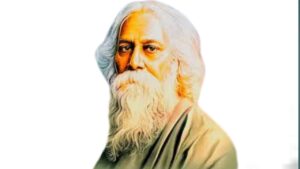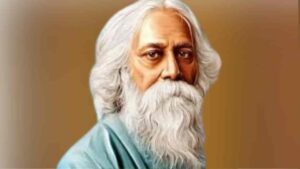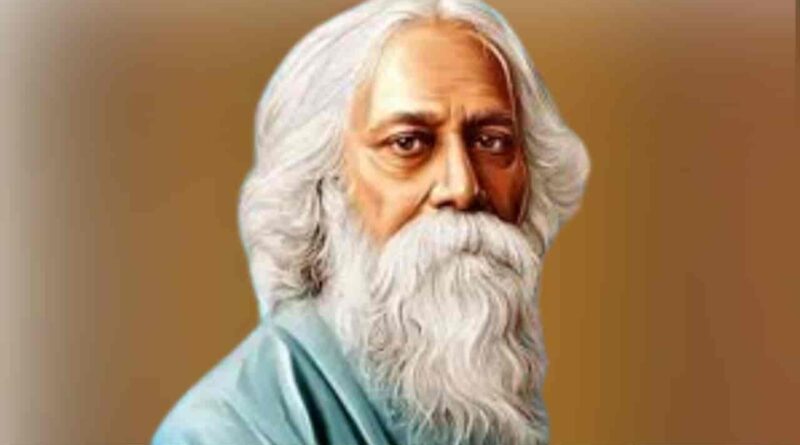Rabindranath Tagore: Exclusive Poetic Brilliance & Legacy
Rabindranath Tagore: Exclusive Poetic Brilliance & Legacy
Title: “The Poetic Brilliance and Enduring Legacy of Rabindranath Tagore”

Introduction:
Rabindranath Tagore:
Rabindranath Tagore, a luminary of Indian literature and the first non-European Nobel laureate in Literature, left an indelible mark on the world with his profound poetry, mesmerizing music, and visionary philosophy.
Born in Calcutta (now Kolkata) in 1861, Tagore’s versatile genius spanned across various creative domains, making him an iconic figure in the realms of literature, music, art, and education. This article delves into the life, works, and enduring legacy of Rabindranath Tagore, a visionary who illuminated the world with his poetic brilliance.
Rabindranath Tagore: Early Life and Formative Years:
Rabindranath Tagore was born into a distinguished Bengali family on May 7, 1861. Growing up in a nurturing environment that valued intellectual pursuits, Tagore had the opportunity to develop his artistic talents from an early age.
His early exposure to music, literature, and nature greatly influenced his creative sensibilities, shaping the unique voice that would emerge in his later works.
Rabindranath Tagore: Literary Mastery and Pioneering Poetry:
Tagore’s literary journey began with poetry, and his lyrical verses captured the essence of human emotions, nature’s beauty, and the complexities of life. His collection of poems titled “Gitanjali” (Song Offerings) brought him international acclaim and led to him being awarded the Nobel Prize in Literature in 1913.
The ethereal beauty and spiritual depth of Tagore’s poetry touched the hearts of readers worldwide, transcending cultural boundaries.
Rabindranath Tagore: Musical Innovations and Melodic Creations:
He revolutionized Bengali music by introducing new styles and blending traditional folk melodies with modern influences.
His soul-stirring songs, known as Rabindra Sangeet, continue to resonate with audiences, carrying the timeless messages of love, longing, and spirituality. These melodies remain an integral part of the cultural fabric of Bengal and have inspired countless musicians and artists over the years.
Educational Visionary and Institution Builder:
Tagore’s visionary approach extended beyond the realms of literature and music. He believed in a holistic education system that emphasized creativity, freedom, and a close connection with nature. In 1901, he founded Santiniketan, an open-air school that later grew into Visva-Bharati University.
This unique institution sought to blend the best of eastern and western educational philosophies, nurturing students’ intellectual, artistic, and spiritual growth. Tagore’s educational vision continues to inspire educational institutions worldwide.
Social and Political Reformer:
Tagore was not only an artist but also an ardent social and political reformer. He vehemently criticized social inequality, colonial rule, and religious dogma. Tagore’s works, such as the play “Chitra” and the novel “Gora,” tackled social issues and explored themes of nationalism, identity, and freedom. His writings sparked debates and encouraged introspection, urging society to challenge prevailing norms and aspire for a more inclusive and enlightened future.
Rabindranath Tagore’s contributions to literature, music, education, and social reform continue to resonate in the hearts and minds of people around the world. His poetry, songs, and philosophical insights have transcended time, serving as a guiding light for generations.
Tagore’s profound understanding of human emotions, his celebration of nature’s beauty, and his unwavering pursuit of truth and freedom make him an enduring symbol of artistic excellence and visionary thinking. As we reflect upon the life and works of this extraordinary poet-philosopher, we are reminded of the transformative power of art and
International Influence and Cultural Exchange:
Tagore’s literary and artistic contributions had a profound impact on the global stage, fostering cultural exchange and appreciation. His travels abroad, particularly his visits to Europe, Japan, and the United States, exposed him to diverse artistic traditions and intellectual currents, which further enriched his own creative expression.
Tagore’s interactions with eminent personalities such as Albert Einstein, Ezra Pound, and William Butler Yeats sparked intellectual dialogue and cross-cultural fertilization, contributing to the global recognition of his work.

Environmental Stewardship and Nature’s Reverence:
Throughout his writings, Tagore expressed a deep reverence for nature and emphasized the need for environmental stewardship. His poetic verses celebrated the beauty of the natural world while highlighting the interconnectedness between humanity and the environment.
Tagore’s profound ecological consciousness, ahead of his time, resonates strongly in today’s world, inspiring environmental movements and advocating for sustainable living.
Legacy and Enduring Relevance:
Tagore’s legacy transcends the boundaries of time and space, continuing to inspire and captivate people across generations. His works are studied in universities and schools worldwide, ensuring the preservation and dissemination of his literary and philosophical contributions.
The annual celebration of his birth anniversary, known as Rabindra Jayanti, is a testament to the enduring reverence and admiration for his legacy in India and beyond.
Contemporary Reinterpretations and Adaptations:
Tagore’s timeless works have not only been revered but also reimagined by contemporary artists, filmmakers, and musicians. His stories and poems have been adapted into films, stage productions, and musical compositions, breathing new life into his narratives and reaching wider audiences.
These reinterpretations serve as a testament to the universality and adaptability of Tagore’s themes, making his ideas relevant and accessible to modern sensibilities.
Inspiring Creativity and Humanism:
Above all, Rabindranath Tagore’s artistic genius and humanistic philosophy continue to inspire creativity, empathy, and a deep introspection into the human condition. His profound insights into love, spirituality, and the complexities of existence touch the depths of our souls, prompting us to reflect on our own experiences and connections with the world.
Tagore’s legacy serves as a reminder that art, literature, and music have the power to transcend barriers, unite humanity, and ignite the flame of imagination and enlightenment.
Conclusion:
Rabindranath Tagore’s unparalleled contributions as a poet, musician, philosopher, educator, and social reformer have left an indelible imprint on the world. His ability to seamlessly blend the spiritual and the mundane, the universal and the personal, continues to resonate with audiences globally.
Tagore’s life and works stand as a testament to the transformative power of art, the pursuit of knowledge, and the enduring spirit of human creativity. As we delve into his legacy, we find ourselves drawn into a world of profound beauty, wisdom, and inspiration, forever enriched by the poetic brilliance of Rabindranath Tagore.




